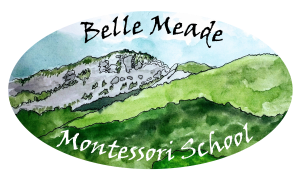What is Montessori?
Dr. Maria Montessori was at the vanguard of developmental psychology. Through her direct observation and interaction with children during the early 1900s, Dr. Montessori realized that children develop through stages, each one distinct and critical to children’s unfolding as individuals and members of society. Over the past century, her educational approach has been proven to be successful both nationally and internationally and is reinforced by current scientific research about child development. At Belle Meade, we implement an educational environment that meets these developmental needs of the early learners, both at the primary and elementary levels, and the adolescent, both at the middle and high school levels.
Through her decades of observation, Dr. Maria Montessori identified four distinct planes of child development, from birth through age 24, each comprised of three-year sub-planes. The Montessori method uniquely structures curriculum and classrooms around these three-year cycles, creating environments that nurture each group’s specific academic, physical, and social-emotional needs.
Within these three-year groupings, children experience opportunities to be mentored and to mentor their peers, further solidifying the lessons they absorb from their teaching teams.
Dr. Montessori recommended a farm setting for adolescents. At Belle Meade adolescents study and work on the farm, using their whole minds and bodies in real work because the adolescent needs real work and to feel that the work is worthwhile. The students must work collaboratively for the farm to be successful, and they work side-by-side with adults. The adults are not only teachers in a traditional sense, but also mentors. Students’ social interactions with peers and adults provide inspiration, feedback, and validation that they are wonderfully unique individuals as well as integral and important members of a community.
Although at the adolescent level academic instruction is more structured than in the earlier years of Montessori education, it continues to be modified to challenge the individual needs of students. As Montessori teenagers age, they are not only academically prepared to pursue college or other interests, they become creative, collaborative, innovative, self-confident, emotionally mature, and socially skilled adults. We choose to be a Montessori school to provide students with the foundation on which to build a happy and meaningful life.
-By Alice Catlin
